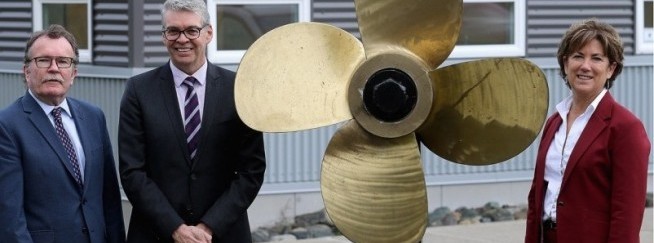Marine training at Camosun College gets helping hand
Source: Andrew Duffy, Times Colonist
Photograph By Adrian Lam, Times Colonist
A financial shot in the arm for Camosun College from an eastern Canadian shipyard will translate into a more robust marine sector on the West Coast and new programs at the school.
Halifax-based Irving Shipbuilding’s subsidiary, Atlantic Towing, has committed $700,000 over three years to help Camosun build a new marine training simulator that will result in Camosun adding two new marine programs to its curriculum, increasing the number of marine professionals entering the industry in this region.
Gilles Gagnon, Atlantic’s general manager, said the company’s intention has been to expand its footprint and, after landing a contract with the Canadian Coast Guard to build two ships, the next step was to develop talent.
In 2018, Canadian Coast Guard awarded a contract to Atlantic for two emergency offshore towing vessels to operate in B.C. waters.
“What follows naturally is local employment,” he said. “It’s exciting for us that people from the Island will be able to train on the Island and, at some point, be able to work on vessels such as ours.”
By supporting the simulator, Gagnon said they expect to grow the number of marine professionals entering the industry by making marine education in Western Canada more affordable and accessible.
The simulator, which is under construction at Camosun’s Interurban campus, could be completed by the end of the year.
The intention, said Camosun vice-president of partnerships Geoff Wilmshurst, is to eventually move it to the Camosun Coastal Centre when the 4,000 square foot marine industry training facility is expanded.
The simulator will allow students to take on a variety of tasks, including ship handling, bridge team management, tug and barge handling operations, anchor handling, ice navigation, search and rescue operations and pilot training.
Camosun president Sherri Bell said without such a partnership the simulator and the new courses would not have been possible, adding this type of connection between industry and education is critical.
“Our programs are focused on giving students the skills they need for a range of in-demand careers,” Bell said. “The generous support from Atlantic Towing and Irving Shipbuilding for a new marine simulator will allow more students to train closer to home.”
Michelle Troare, Acting Director of Camosun Continuing Education and Contract Training, said the centre has also been working with First Nations to create a pathway for Indigenous students to enter the marine workforce.
“By building a simulator, it also allows students who come through the centre to go into nautical training as well, which we haven’t been able to offer in the past,” Troare said. “This opens a lot of opportunity.”
Atlantic has already forged relationships with the Songhees First Nation, which include a joint venture involving Songhees Events and Catering and ESS-Compass Group Canada, and a contract with Salish Sea Industrial Services.
Songhees chief executive Christina Clarke said the marine simulator will be a game-changer for their students.
“Songhees Nation’s economy was intimately connected to the Salish Sea for millennia,” Clarke said. “Forming Salish Sea Industrial Services with Ralmax and Esquimalt Nation is one of our strategies for returning to the marine economy.”



Site design by Ravensfoot